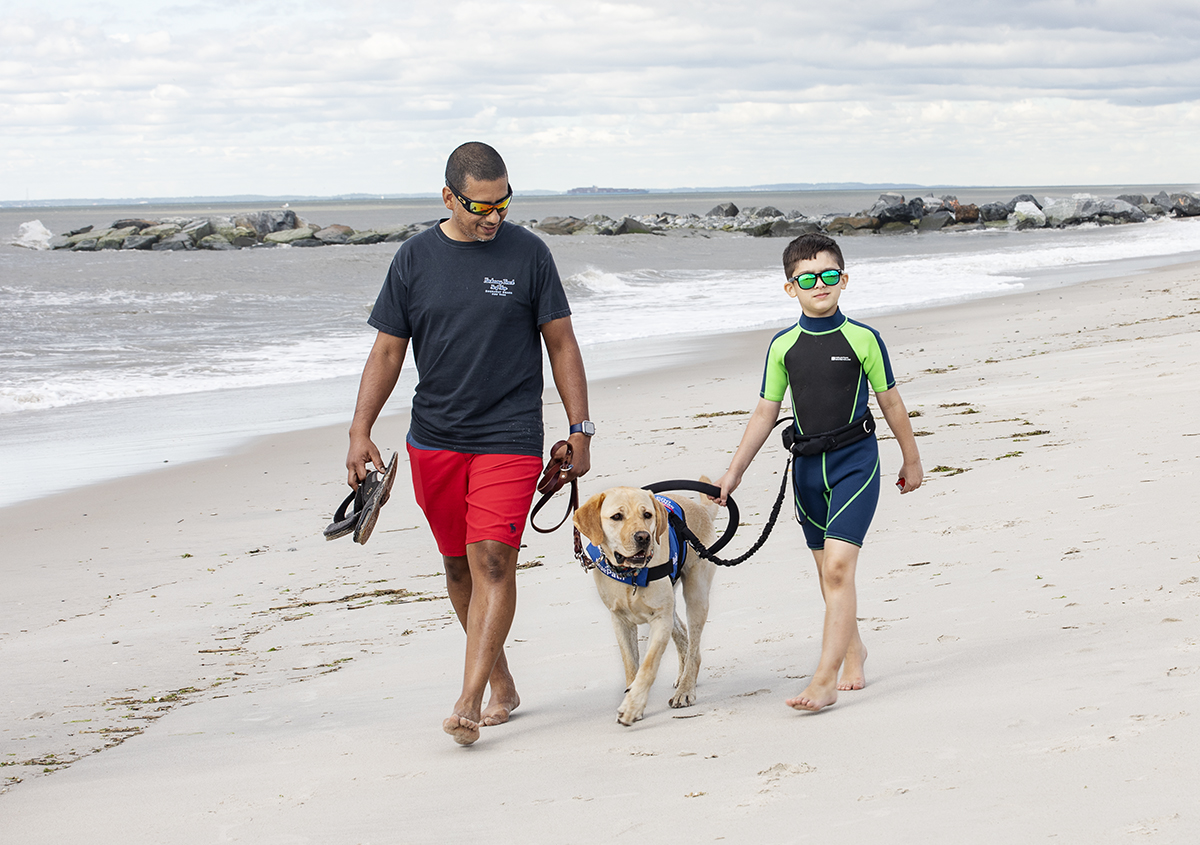
For some children and adults diagnosed with Autism Spectrum Disorder (ASD), service dogs are the perfect companion. Trained to help keep an individual from bolting, they also foster opportunities for independence and socialization by facilitating connections with other kids.
The nonprofit organization BluePath Service Dogs, based in Wappinger Falls, N.Y. — and actively looking for a permanent location — has been training service dogs for people with autism since 2016. Each BluePath dog comes with thousands of hours of training from dedicated volunteers and professional staff. The organization’s website has an excellent description of how the program works, the application process and more.
The Boost spoke with Michelle Brier, BluePath co-founder — along with Caroline McCabe-Sandler and Jody Sandler —and vp of marketing & development, about the difference between a therapy and service dog, how BluePath dogs help autistic individuals navigate the world and more. The below interview has been edited for length and clarity.
Let’s start with the annual Walkathon on May 11. It sounds pretty awesome. There’ll be bouncy houses and a DJ and sports activities and sensory spaces, and it seems some changes are also in the works. (More info here)
We make changes every year to improve the event experience. Last year we had around 500 people and that’s a large crowd for someone who may have a tough time with sensory processing. So, this year we created special pathways for service dog families and anyone needing extra assistance, as well as a special area for check in. Our food trucks can meet a variety of dietary restrictions and we added a shuttle for people who have to park in the overflow lot. For some families, even a five-minute walk can be challenging.
Explain the difference between a therapy dog and a service dog.
A therapy dog is a 1-to-many ratio. They go into a classroom situation, for example, where they can helps kids learn to read because petting the dogs helps them to focus. They also have to be invited into an establishment. Under the Americans with Disabilities Act, a service dog assists one person with a disability and has access to any public establishment.
Are there certain types of behaviors that indicate a child would do well with a service dog?
A child who loves dogs is certainly helpful, or a child who can overcome a fear of dogs prior to a placement.
Elaborate a bit on how these dogs can help an individual navigate the world.
Our dogs prevent children from bolting, but there are additional benefits I could talk about for hours. For one, there’s so much stress in transition and we find our dogs help to mitigate this every day. Just holding the handle on the dog’s back or touching the dog can be a grounding force that promotes a calm demeanor and supports mood regulation.
Unlike other service dogs, we often encourage people to go up to them. It’s always important to ask the parent and/or child or caregiver, but we choose friendly, floppy-eared, happy dogs partially because of the approachability for other people. We want it to be an opportunity to practice interactions and speak verbally.
Is it expensive for a family to have a service dog?
The average cost for us to breed, raise and match a service dog with a family is about $40,000, and we don’t add any of those costs onto the family. We charge a nominal fee of $1,200 for equipment and supplies. For us it’s also representative of a psychological investment in the process, to find families that are committed and ready to work hard for this dog and our program.
Families are also responsible for covering the cost of food and veterinary care and miscellaneous supplies going forward.
It seems there might be a move in the works, and that BluePath is scaling up in general.
There are a lot more autism diagnosis and we want to be able to scale our mission accordingly. A lot more families need our help so, yes, we have some big goals. A priority is a facility where we can breed, train and house our dogs.
Nationally we’re seeing that volunteer rates are declining in the philanthropic sector so we’re always looking for volunteers to raise and foster our dogs. They’re crucial to fulfilling our mission.



